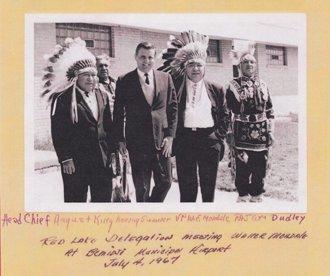
As a member of the Subcommittee on Indian Education, Senator Mondale was a strong advocate for American Indians and a harsh critic of federal Indian policy. The retention of and respect for Indian culture was a strong theme throughout all his work. "The present educational system for the American Indian is a tragedy," stated Mondale in a Subcommittee hearing, "and it is a responsibility for which almost exclusive blame rests with the federal government." He was dismayed when a representative from the Mesquakie Tribe of Tama, Iowa testified that the people of his tribe were never consulted on decisions made about their children's school and that, in fact, the schools were directed by boards on which Indians could not serve because they were not eligible to vote in the school board elections: "I think this is a disgrace. These parents have no control whatsoever over their children or what their children grow up to be."[1] Senator Mondale's work on the final report of the Subcommittee on Indian Education led to the passage of the Indian Education Act, signed into law June 23, 1972. Of his contribution, Senator Kennedy (D-MA) said, "I believe he has contributed more to the work in the field of Indian education than any other member of this body."[2]
Senator Mondale mustered votes, led Senate debates, and generated public support on behalf of Indians in several areas, including funding for public housing and urban health programs. In 1966—his first term in the Senate—he successfully fought for public housing on the Leech Lake Indian Reservation in Minnesota. Senator Harris (D-OK) addressed his colleagues in the Senate, "This occasion was truly a break-through. It marked the first public housing to be built on any of Minnesota's reservations. And for that, Senator Mondale ought well to be proud. For there has been no harder worker for the Indian than the junior Senator from Minnesota."[3]
Throughout five consecutive Congresses, Senator Mondale sponsored or cosponsored a bill that laid the groundwork for the return of approximately 28,700 acres of land to the White Earth Band of Ojibwe. The final bill, S. 1327, declaring that lands be held in trust for certain Indian tribes, including the Minnesota Chippewa Tribe, White Earth Reservation, was approved October 20, 1975.
- Indian Education, 1969: Hearings Before the Subcommittee on Indian Education. Part 1. 91st Cong., 1st sess., February 18, 19, 24 and March 27, 1969 in Washington, D.C.; April 11, 1969 in Fairbanks, Alaska.
- 92nd Cong., 1st sess., Congressional Record 117 (February 25, 1971) at 3954.
- 89th Cong., 2nd sess., Congressional Record 112 (July 28, 1966) at 17431.